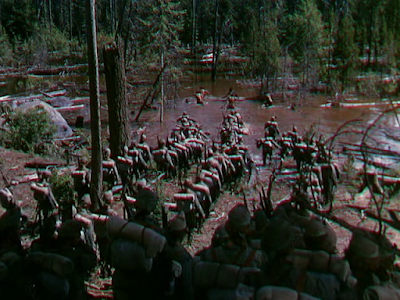
The Sea of Grass (Elia Kazan, 1943) It's Kazan's third feature as a director, playing in Louis B. Mayer's sandbox (literally—the film is shot in-studio at M-G-M, making use of stock-footage of rolling fields already in the can, with some location back-projection), and the founding member of The Actor's Studio has a cast of anybody but—Spencer Tracy and Katherine Hepburn (in their third film together), Melvyn Douglas, Harry Carey Sr. and Edgar Buchanan, all pro movie actors who'd already figured out the best way to project on film, without having to rely on sense-memory for it.
Kazan hated this film and discouraged anybody who'd listen from seeing it. But, despite its soap-ish tendencies as a romance, it has an underlying ecological message. Colonel Jim Brewton (Tracy) is a very well-landed cattle baron and resists any efforts by the "guv'mint" towards granting homesteading rights or development on the open range. For him, its a matter of keeping it unspoiled. "God's work," as he calls it. That's his purpose, but he's a might surly, mulish and uncommunicative. Along comes city-girl Lutie (Hepburn) into his life, and he bends slightly, like the trees she insists be planted at the entrance to their estate, as they sway in the harsh prairie winds. He'll bend with a "wait-and-see" attitude, as in "Wait—you'll see." He yields to Lutie on her friends's homesteading near his property. But, a clash is inevitable. "Fences are a curse word in these parts, he informs her.There are other complications. She's a city girl on the prairie and distances between people are daunting. Then, there's the town lawyer, Chamberlain (Douglas) who has two strikes against him in Brewton's suspicious eyes—he wants the land open to homesteading, and he has his own eyes for Lutie, waiting to pounce whenever there's a crack in the Brewton marriage, which is inevitable. What his motivations are in both areas are suspect—Brewton Chamberlain are bitter enemies, politically and socially. Chamberlain just might be making the fight personal and can't help himself. With both the open fields and Lutie, he can't leave well enough alone.
The rise in Chamberlain's political career (becoming a judge in the district) dooms Brewton's ecological dreams, and soon the prairie becomes home to sod-busters, dependent on weather for their success, and when the rains stop, the crops fail and the farmers leave, the countryside becoming a barren dust-bowl. It's a hollow, dry victory for Brewton—he's proven right (which no one will admit) and the land goes to waste. And, in the meantime, Lutie has left, leaving Brewton and cook Jeff (Buchanan) to raise the kids: loyal but neglected Sara Beth (Phyllis Thaxter), and black sheep son Brock (Robert Walker), who it is more than suggested may be Chambelain's child.
One can see why Kazan, Tracy and Hepburn were attracted to the material. The ecology theme (even if espoused by a bull-headed "protect-what's-mine" cattle rancher) should have been close to the sod of anybody who'd come out of the depression, and the "unbranded scarlet letter" theme must have been attractive to Hepburn who enjoyed tilting at societal windmills. At this point, Tracy and Hepburn knew each other's tricks on-set. And it's interesting to see that their personal back-and-forth's in this film are much the same as they are in Guess Who's Coming to Dinner decades later. She's adoringly passive with a steel spine, and he's remote until his face collapses with emotion. Kazan would come out of this film feeling compromised—and, indeed, this film about the vastness of open land and the prairie feels like it was filmed inside a glass ball—and would explore other ways to make movies, as opposed to being stuck on the sound-stage. He'd start insisting on location work and even filming with a documentarian's eye. His search for authenticity in artifice could not be held behind stage-doors and artificial light.


















































